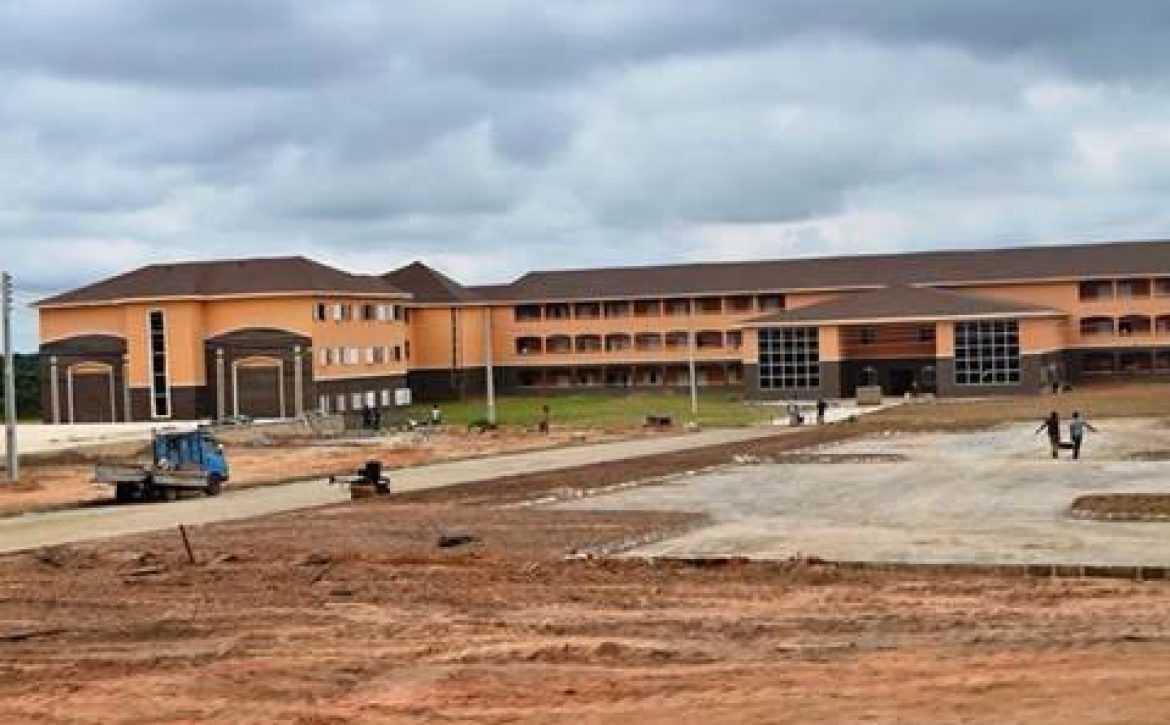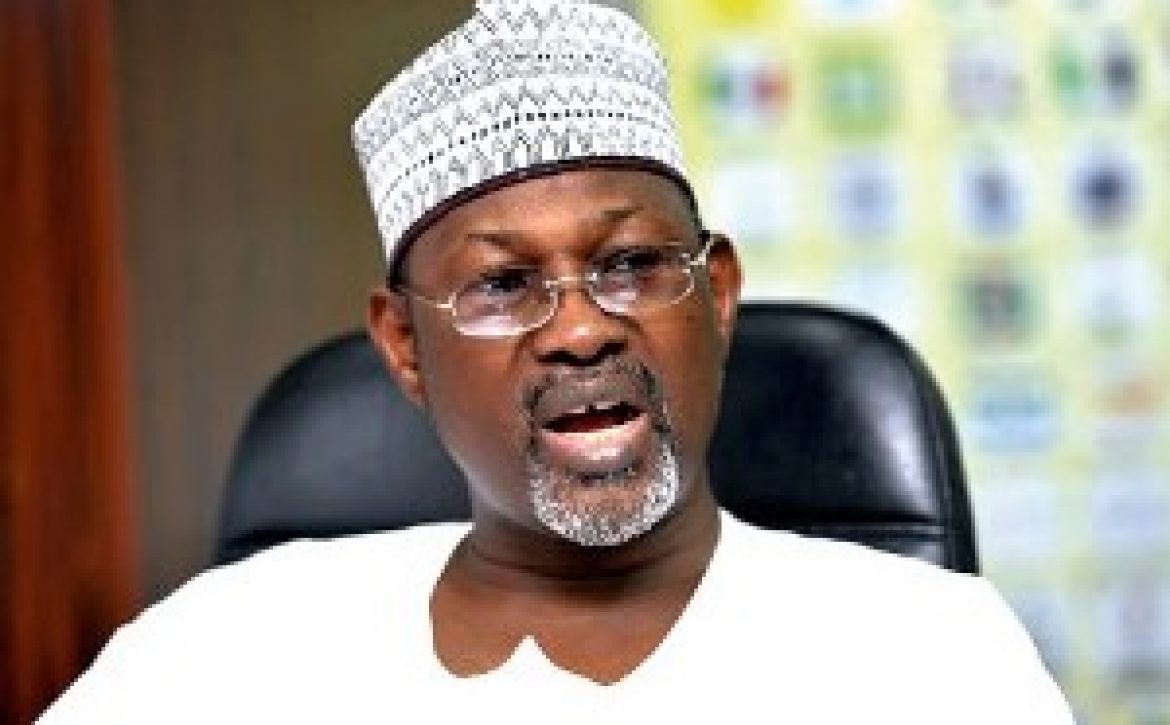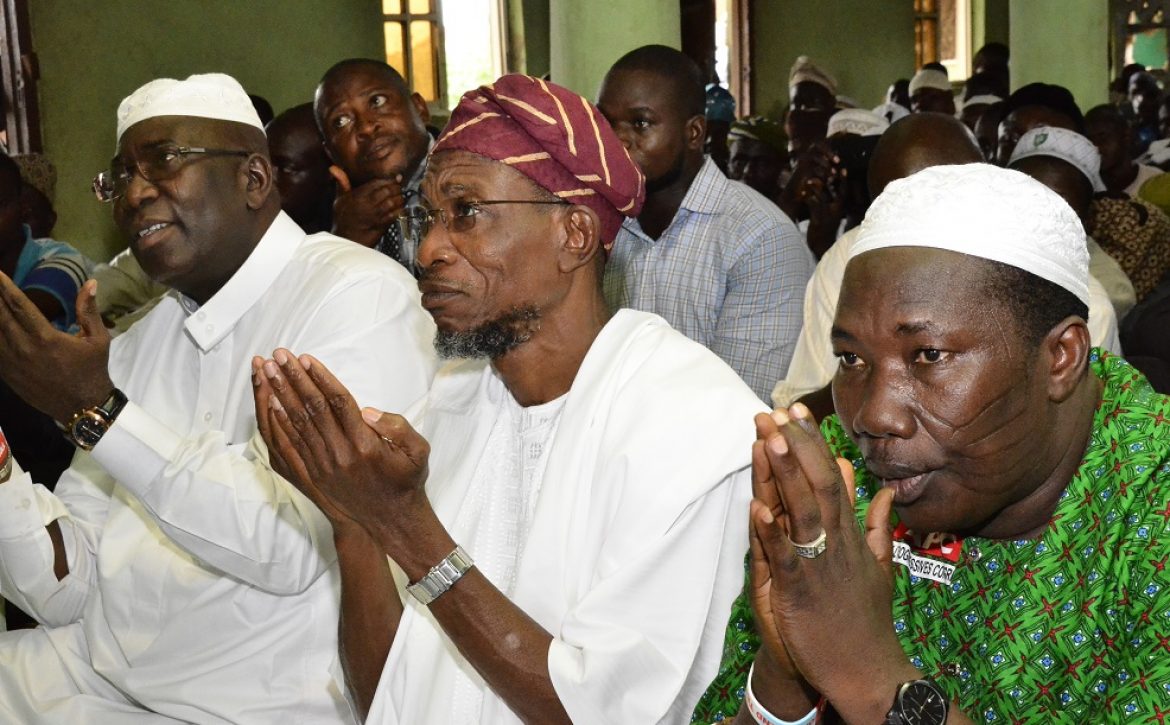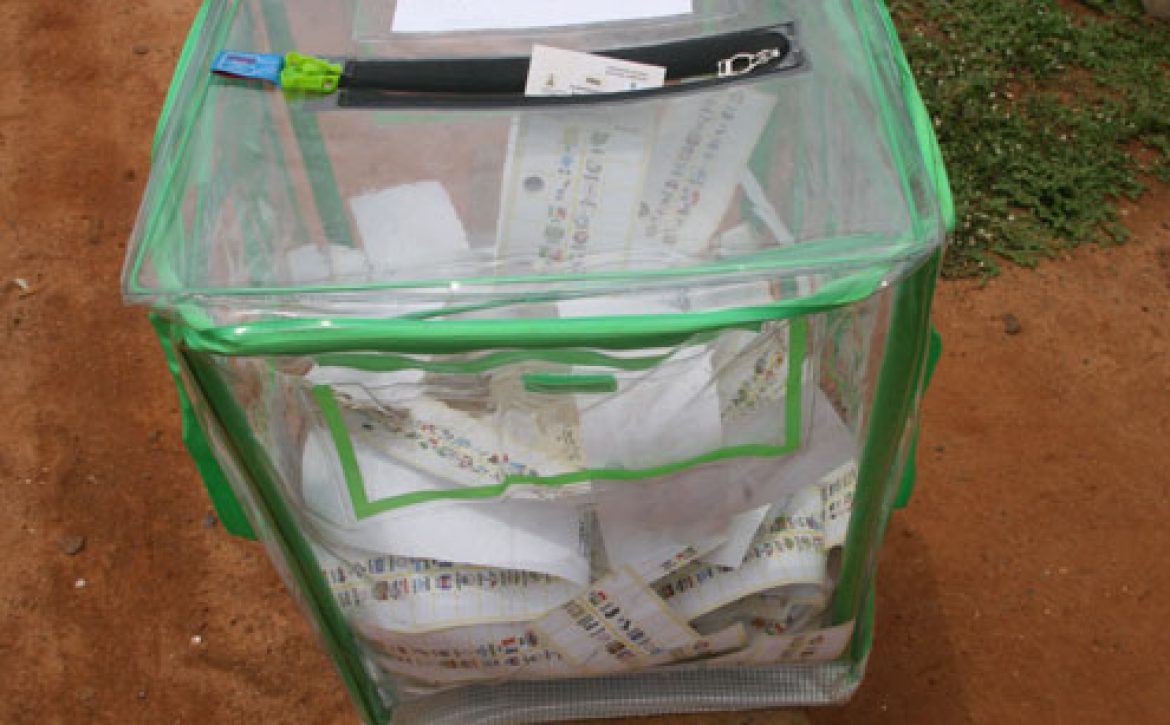People from every walks of life share their experiences and thoughts on the Governor of the State of Osun in Amazing and memorable Quotes. Share with your friends and give your thoughts and feedback on any of our platforms. Facebook (Government of the State of Osun) or Twitter @stateofosun

Category: News
 Friday, May 24, 2013. 35 governors gathered to vote for the Chairman of the Nigeria Governors Forum (NGF). With the initial postponement and intrigues that surrounded it, it was going to be a night of long knives. With the Presidency interested in the outcome and with Governor Amaechi determined to give it another shot in spite of his open confrontation with the President, it was going to take more than ordinary determination to navigate the treacherous waters.
Friday, May 24, 2013. 35 governors gathered to vote for the Chairman of the Nigeria Governors Forum (NGF). With the initial postponement and intrigues that surrounded it, it was going to be a night of long knives. With the Presidency interested in the outcome and with Governor Amaechi determined to give it another shot in spite of his open confrontation with the President, it was going to take more than ordinary determination to navigate the treacherous waters.
It would take grit, uncommon courage and the ability to outfox the henchmen of the Presidency. At the entrance of the venue of the election, all the Governors were mandated to submit all their mobile phones. But one man particularly suspected there was going to be foul play so he sneaked in a pen camera.
He recorded the vote counting surreptitiously until when Governor Godswill Akpabio noticed they were being secretly recorded. When controversy sprang up on the actual winner of the contest, he released the video to the public. The man who exposed the lie for what it was was Ogbeni Rauf Aregbesola, the Governor of Osun State.
Controversy is his middle name. For 9 months, he operated solely without commissioners. He renamed Osun State and gave it a new nomenclature called ‘State of Osun.’ He fashioned a new educational policy and called it reclassification of schools. In one fell swoop, schools were merged and bedlam ensued. In one school, we were treated to a picture of students dressed in choir robes, hijab and masquerade attires as uniform. Some suspected Muslim fundamentalists broke into a school and flogged a teacher. For the first time in the South West, religious embers were stoked. Then came the uniform controversy. All the public schools were mandated to adopt the same uniform all over the State. Fakunle Comprehensive School, Osogbo was demolished despite pleas that a school with such a grand tradition should be allowed to stand. He declared Hijra as a public holiday for Muslims, the only state to do so in Nigeria. Then he declared another holiday for traditionalists called ‘Isese Day’. Suspected of being a religious fundamentalist, he donated N35m for the burial of late Prophet Timothy Obadare. And then the ‘Opon Imo’ controversy. Then came the issue of the ‘Sukuk’ Islamic bond. His tenure could be appropriately termed ‘one week, one trouble’.
In spite of the unending controversies and despite the appointment of an Osun State indigene Jelili Adesiyan as the Minister of Police Affairs, it is my carefully considered opinion that Ogbeni Rauf Aregbesola will win the August 9 election. Here’s why I think he will trump Otunba Iyiola Omisore, the PDP’s candidate.
1. Omisore’s Poor Candidature
Iyiola Omisore is not Peter Ayodele Fayose. He lacks the charisma of Fayose. He is not a Jimi Agbaje. He lacks the character of Agbaje. He doesn’t have the mass appeal even though he has the notoriety. While you cannot deny that he has a semblance of structure having been the Deputy Governor of the State and also a Senator of the Federal Republic of Nigeria, his major Achilles heel is that he has been successfully tainted by the accusation of involvement in Bola Ige’s murder. This is one accusation that has refused to go in spite of his protestations. In addition, his campaign is a poor caricature of Ayodele Fayose’s. Whoever is his campaign director needs to get fired as he has run one of the most bizarre and lacklustre campaigns ever. His efforts to align with the masses fell flat- his handling of two roasted corn cobs in both hands, his ride to a campaign venue on an ‘okada’ and his absurd combination of two different ‘Ankara’ materials as cloth are images that have defined his campaign. He has not successfully exploited Rauf Aregbesola’s obvious weaknesses.
When it was time to debate Ogbeni, he didn’t show up. That was an opportunity to redeem himself but he failed to utilize it. Ayo Fayose challenged Kayode Fayemi for a walk on the streets of Ado-Ekiti but Iyiola Omisore claimed he didn’t come for the debate because he didn’t want Ogbeni to beat him up. Is it any wonder that the President has not attended any rally in Osun State even up till now? The President must have read the handwriting on the wall and there was no point dissipating energy in the wrong direction. PDP lost it when the ticket was given to Omisore because he is irredeemable. If he’s banking on federal might, he got it wrong this time because you can only rig successfully where you are popular. In fact, Ogbeni will be gifted this election not because of his superlative performance but primarily because of Omisore’s poor candidature.
2. Disunity In The PDP House
No situation exacerbated the looming disunity in Osun State PDP than the statement credited to the Minister for Police Affairs that he will beat Senator Isiaka Adeleke when he leaves office. Adeleke claimed he was assaulted during a party meeting and he subsequently defected to APC. Fatai Akinbade, a former Chairman of the State PDP and a man who served three different times as Commissioner under three different military regimes also defected to the Labour Party. Former Governor Olagunsoye Oyinlola has not come out openly in support of Iyiola Omisore despite belonging to the same party. In fact, he was even courted by the top echelon of the APC. As a former National Secretary of the party and also a former Governor of the State, his body language speaks volumes. Oyinlola is a Prince of Okuku, the capital of Odo-Otin Local Government, one of the 30 Local Government areas in Osun State. It is instructive to note that Odo-Otin is one of the three local government council areas with the highest number of 15 wards in the state after Osogbo and Iwo.
3. Ogbeni Aregbesola’s Above-Average Performance
In spite of his controversies, only a blind man will ignore Ogbeni’s performance. He has built mega schools, many of them super infrastructures with commendable appurtenances. He has constructed over 20 intercity roads and more than 15 intra-city roads. This is apart from some very ambitious dualization projects embarked upon. The free festive inter-city train ride from Lagos to Osogbo has become a constant feature of his administration. I was informed that he has built 74 primary health Centres all over Osun State. He has increased IGR in Osun from N300m to N1.6b and has not been known to borrow from any financial institution, save for the Islamic bond he took. His O’Meals project is laudable. Love him or hate him, there’s no denying the fact that he has improved the face of governance in the state.
4. Ogbeni’s Massive Campaign Network
Ogbeni has embarked on a blitzkrieg of a campaign. Maybe due to the lessons learnt from Ekiti’s recent election, he has left no stone untouched. This is the first time I’m seeing an incumbent campaign as if he’s the under-dog. He has run a very good campaign so far- both terrestrially and on social media. Going by his student unionism antecedents, one is not too surprised that he has at least 2 former student leaders in his cabinet and they are both active in running his campaign. Most of the controversial issues raised have been either effectively addressed or well mitigated by this team. When the issue of religious fundamentalism came up, they released the video of Bishop David Oyedepo’s visit. Ogbeni has been photographed genuflecting to Pastor Enoch Adejare Adeboye. He attended a major night vigil organized by a white garment church. He has been dancing ‘skelewu’ at all rallies to show he can connect with the populace. He has run his campaign without Bola Tinubu being visible so the issue of the overbearing influence of the APC leader has been largely well managed. Ogbeni runs the best propaganda machinery in the South West and the effect can be seen in how he has successfully diverted attention from his controversies while making Omisore seem to be the controversial one.
5. The Seeming Inconsequential Position of Osun In National Politics
In the calculation of the PDP, Osun State may not really be worth the trouble. Like Ekiti, one would have expected a massive support from the centre but apart from the involvement of the Minister for Police Affairs Jelili Adesiyan and party big wig Buruji Kashamu, no other major PDP political actor has been to Osun State. Not even the Vice President Namadi Sambo who usually represents the President on most occasions. The PDP Chairman has been missing in action conspicuously and in my opinion two major issues come into consideration here: firstly, the antecedents of Osun politics where the State was the only one won by the erstwhile ACN candidate Nuhu Ribadu during the 2011 Presidential elections without having any impact on the outcome of the full national election results. The resources are limited and they would rather concentrate such where they can get the greatest political capital- Adamawa, Nassarawa, Edo, Oyo, Ogun and Lagos States.
The second is the opportunity to take the wind out of the sail of APC’s complaint that Osun’s elections will be rigged by the PDP just like they suspected it was done in Ekiti. Furthermore, it is PDP’s calculation that APC will be misled to believe they have stopped PDP’s incursion in the South West. Consequently, if APC wins Osun, the party will be seen to be a bad loser anytime it complains after another loss. So PDP can afford to lose Osun State without batting an eyelid.
6. Ogbeni’s Grassroots Support
Rauf Aregbesola is well schooled in the art of politics. He has been able to successfully marry both politicking and governance which was one of the major issues Governor Kayode Fayemi had. You can accuse him of everything but you can never accuse him of not connecting with the populace. With the pupils, he has appeared in their school uniform on many occasions. He has held his health walk in several towns across the states. He has several mushroom groups such as De Raufs located all over the state and these ones project his ideology. He has given himself the identity of ‘Oranmiyan’, a progenitor that the Yorubas respect. His support base is not limited to a particular demographics – he has a broad base across all sectors in the state. Ogbeni is street smart and can fight dirty if need be. A veteran of many political battles, he is not a gentleman like Kayode Fayemi and can be very rambunctious. That was why he asked people to come to the polling units with charms on Election Day. If there is anyone who is a true protege of Bola Ahmed Tinubu, he is one. That is one of the reasons the Ekiti story cannot repeat itself in Osun State.
7. The Geo-Political Demographics in Osun State
The geopolitical demographics currently favour Ogbeni Aregbesola. Ogbeni is from Osun East Senatorial District, the largest district in the State.Though Iyiola Omisore also hails from the same district, Ogbeni is from Ilesa, one of the three biggest towns with the highest number of voters in the state while Omisore is from Ile-Ife. Osun East with a voting strength close to 500,000 comprises of 10 Local Government Areas- 4 in Ife and 6 in Ijeshaland. There are about 1.2m registered voters in the state. Ogbeni is expected to have a clean sweep of all the 6 Local Governments in Ijeshaland while Omisore will sweep his own 4 Local Government areas. However, Ogbeni’s deputy Mrs Laoye-Tomori is from the state capital, Osogbo and so he’s expected to pick up the votes in the town. Iwo, which is the largest town in the State is predominantly Muslim and this will also play to Ogbeni’s favour.
Omisore’s deputy, ex-Speaker Adejare Bello hails from Ede, the same town Senator Isiaka Adeleke hails from. ‘Serubawon’ as the Senator and former Governor is popularly called has more grassroots support in Ede than Bello. His family even has a University called Adeleke University in Ede.
 Eyes are on Osun State as the people prepare for the August 9 governorship election. In this piece, Erasmus Ikhide contends that the pedigree of the flag bearers, and not their religious leanings, will shape the contest.
Eyes are on Osun State as the people prepare for the August 9 governorship election. In this piece, Erasmus Ikhide contends that the pedigree of the flag bearers, and not their religious leanings, will shape the contest.
Both Governor Rauf Aregbesola and Bishop David Oyedepo seem to be in agreement with Kutaddgu Bilig, written for Turkish ruler of the Karakhanids in 1069, which said, “To control the state requires a large army. To support the troops requires great wealth. To obtain this wealth the people must be prosperous. For the people to be prosperous the laws must be just. If any one of these is rejected the state will collapse.”
The single most touching issue plaguing this nation or any other nations of the world today is religious crisis. Religious disharmony is so combustible to the extent that it could consume any nation or people if not properly managed. Political gladiators in history, especially in Nigeria have manipulated the religious vulnerability of the people and still doing so for political gains.
The People Democratic Party’s (PDP) candidate, Senator Iyiola Omisore in Osun State’s 2014 Governorship election, is frantically exploiting religious sentiments, blackmail, and other incendiary mechanisms to hoodwink the electorate. One of such gimmicks sold to the general public is the open allegation that Governor Rauf Aregbesola’s administration has not only blank out the Christian community in the state in terms of patronage, but has made efforts to muscle them out of existence.
The charge fall flat on its face. Out of 36 members of the cabinet in the state, 26 are Christians; also, out of the 12 members representing Osun in the National Assembly, 6 of them are Christians. The Christians also had the majorities among the local government chairmen, which shows how committed the governor is to bring about religious peace and harmony in the state.
The allegation has been long in coming without thorough checks by his critics on the the religious issue Governor Aregbesola’s administration inherited from the previous PDP government. It’s common knowledge – except for the mischievous band of frustrated politicians who daily waxed in delusionism – that the governor is out to Islamise the state. The charge bothers more on the wearing of Hijab by the Muslim students in Christian schools.
The issue of Hijab would have been rested by now, if not for want of excuse of failures on the part of PDP, which governed the state for roughly eight years before Ogbeni retrieved his stolen mandate from them. For the records, it was under Governor Olagusoye Oyinlola’s administration, a PDP Governor that the Muslim community went to court and insisted on their wards attending schools in their Islamic wears as part of the school uniform. As we speak, the matter is still being pursued in the court by the Muslim community. Dressing Ogbeni in a borrowed robe to score cheap political points on the bases of religion fanaticism is clearly a crass political opportunism and promotion of falsehoods to a grand art.
On the other hand, the accusation that School Reclassification process in the state didn’t factor in the National School Policy of 6 3 3 4 System is another tactical attempt to paint an otherwise noble policy in a bad light. The need to provide world class learning environment necessitates the ongoing building of model elementary Schools across the state in accordance with the UNESCO Schools Reclassification standard, which has since been adopted by the US and other developed countries.
The elementary Schools are state-of the-arts structures that accommodate 900 pupils of ages 6-9, in the first grade to the fourth grade, i. e, Primaries 1-4. In the same vain, government has built over 15 Middle Schools across the state. They are also state-of-the-arts structures with accommodation provisions of 1,000 capacity for the students. The middle school is for the fifth to the ninth grade which is the present primaries 5-6 and the Junior Secondary School JSS 1-3 in the age ranges of 10-14 years. Students in the High School are within the age bracket of 15-17 years. This category is known as Grades 10-12. The High School Infrastructural facilities will accommodate 3000 students.
It is in the light of these strides and other innumerable achievements of Governor Rauf Aregbesola that the General Overseer of the Living Faith Church a.k.a. Winners’ Chapel, Bishop David Oyedepo, on Wednesday, 9th July, 2014, said the infrastructural renewal, particularly the education revolution in Osun deserves global applause.
Bishop Oyedepo gave his assessment in Osogbo, southwest Nigeria, when he paid a courtesy call on the Governor of the State, Ogbeni Rauf Aregbesola. The cleric noted that any governance that is producing results and affecting the lives of vast majority of the people must be deeply appreciated, irrespective of religious inclination. The Bishop strongly appealed to stakeholders to always be at the vanguard of peaceful coexistence, noting that there is nothing like living in peace, working in peace and promoting peace.
“There is nothing like peace in the whole world. We should always walk towards whatever will promote peace and peaceful coexistence among our people. Let us work for an atmosphere that encourages peace, which engenders growth and development. This is because life is all about promoting the well-being of the people.
“I deeply appreciate the infrastructural development. Besides, the education revolution is for us a great achievement. “I can see the massive road construction going on. This is to the benefit of the people. No policy can remove the roads. I am very impressed,” Oyedepo said.
Observers of political development in Osun should know that Governor Aregbesola’s administration has no political, religious or tribal preference. It is absolutely impossible for Ogbeni to be a religious fundamentalist owing to his all-faith inclusive background. One cannot but wonders why the governor has been so described by mischievous makers who erroneously tagged his administration as pro-Islamic faith.
The only description that suits Aregbesola’s administration by any forward looking individual, is zero tolerance for religious cohabitation and opportunism. This largely accounted for near total peace in the State. Aregbesola has always encouraged people to practice whatever faith they profess, even within his own immediate family.
“My upbringing in Yoruba setting has given no basis for religious antagonism and mutual distrust. “It is impossible in Yoruba milieu not to imbibe the culture of accommodation, tolerance and understanding of the faith of others.
“I guide my faith as much as I fight for the protection of the faith of others. If anyone would accuse me at all, it should be that I have zero tolerance for fundamentalism. “Therefore, my liberal disposition to religion is thus farther from the erroneous impression of being an Islamic extremist,” Aregbesola said.
It is clear the mischief makers has been engaged in a futile battle to make up for their irredeemable battered image and character – which is the ultimate determinant of the August 9th election. The people of Osun will chose between sound character and bloodletting criminal gang, between concrete development and deceptive promise of development and people-oriented governance and propagative ones.
THE NATION
 He made the assurance at the official commissioning of three middle schools in Ikirun, Iragbiji and Ila-Orangun, stressing that with the spate at which his administration has been building new schools, the era of unfit learning environment would be history completely.
He made the assurance at the official commissioning of three middle schools in Ikirun, Iragbiji and Ila-Orangun, stressing that with the spate at which his administration has been building new schools, the era of unfit learning environment would be history completely.
The schools are Holy Trinity Middle School, Ikirun; NUD Middle School, Iragbiji and St Julius Middle School, Ila-Orangun, all in the Osun Central Senatorial District.
The schools built in this same structural pattern, with a capacity to accommodate 1,000 students each have 25 classrooms, one large examination hall, 16 toilets, one audio visual and ICT rooms, recreational facilities among others.
“We are committed to developing both human and material capitals in our state. This explains why we have specially focused on the education sector. Where we are taking the state is far in terms of development.
“And we’ve just begun. Before the end of this year, more than 100,000 pupils and students will be accommodated in the newly-built school buildings.
 With the dust of the upcoming Osun gubernatorial election beginning to settle, it is now clear to everyone that this is clearly a one-horse race. The main opposition in Osun, the Peoples Democratic Party (PDP), will surely believe they are still in the race. But, the more they boast of their financial prowess and their propensity for violence, the more they grow unpopular with the very people they hope to govern. The more they spend bashing the very vivid and life-saving achievements of the incumbent, they more they are spoted for their lies. The proverbial wind has blown and the anus of the chicken is on public display.
With the dust of the upcoming Osun gubernatorial election beginning to settle, it is now clear to everyone that this is clearly a one-horse race. The main opposition in Osun, the Peoples Democratic Party (PDP), will surely believe they are still in the race. But, the more they boast of their financial prowess and their propensity for violence, the more they grow unpopular with the very people they hope to govern. The more they spend bashing the very vivid and life-saving achievements of the incumbent, they more they are spoted for their lies. The proverbial wind has blown and the anus of the chicken is on public display.
It is obvious that Sen. Iyiola Omisore clearly miscalculated in his ill-advised bid to unseat Ogbeni Rauf Aregbesola. He also did not take into account the mentality of the people he was hoping to trick, bribe and force into enslavement. For starters, his party is losing credible members like rats jumping off the sinking Titanic. Only recently, four of the six state executives of the PDP publicly declared for the APC. One of them, the Former Assistant State Secretary of the party, Alhaji Razaq Oyetunji, who spoke at the Ilesa leg of the Ogbeni Rauf Aregbesola Reelection rally on behalf of his group, urged the remaining members of the PDP to leave the “sinking” party.
“The PDP have nothing to offer,” he said. “It is a group of selfish people with very dark and evil intentions. They have no good plans for the people of Osun and we should stay away from that sinking ship. Don’t be deceived. Let’s all go out and vote for Ogbeni Aregbesola come August 9th. He has done more than enough to be reelected.”
Meanwhile, the Ogbeni Aregbesola ‘Love Boat’ is suffering from over-crowding. Very eminent and credible personalities have been falling over themselves to endorse the man the people love to call ‘The Symbol.’ These credentialed people have no qualms staking their well built brand on Ogbeni’s. It is unprecedented. From scholars to clergymen to international organisations to senior members of the PDP itself, the accolades have never stopped coming.
Only two weeks ago, Ogbeni was bestowed the award of The Most Innovative Governor Supporting Education in Nigeria. This was conferred on him in Osogbo by Zuriel Oduwole, the ten year-old Nigerian girl who has made history as the youngest person ever to be interviewed in Forbes and was quoted as one of the 100 most influential Africans. She had this to say of the Osun governor; “It is difficult for a child to learn without the right learning aid. Good learning aids have been made possible for students in this part of the world. It is in recognition of this that on behalf of the ‘Dream Up, Speak Up, Stand Up’ Project that I present the award of the most Innovative Governor in Nigeria supporting Education to Governor Rauf Aregbesola.”
Last week, the General Overseer of the Living Faith International Ministries was marveled by the number of road projects and the unique educational transformation the state was undergoing that he publicly stated that the governor deserves “global applause”. Hear him: “I deeply appreciate the infrastructural development (of Osun). Besides, the education revolution is for us a great achievement. I can see the massive road construction going on. This is to the benefit of the people. No policy can remove the roads. I am very impressed,” Oyedepo said.
Besides these, most of the traditional leaders in the state have given their blessing to Ogbeni Aregbesola’s second term bid. One after the other, they thanked him for bringing progress and prosperity to the people and fulfilling his campaign promises. They also prayed for his good health and pledged their support.
The Timi of Ede, His Royal Highness, Nurudeen Adesoji Lawal, said, “May you (Aregbesola) be granted the key to Abeere (Government House) the second time.” Enough said.
The Elademure of Ibokun, Oba Festus Adegboro, was must direct in his endorsement; “Rauf Aregbesola, whoever says you will not make a second term will be disgraced by God’s grace. What Aregbesola is doing here in Osun is what people rush to foreign countries crave for.”
A Yoruba socio-political and economical body, Afenifere Renewal Group, after studying the antecedents, policies and plans of each candidate said this of Aregbesola: “We endorse him for reelection and enjoin residents of the State of Osun to vote massively for him in the forthcoming gubernatorial election. We believe that the future of the State of Osun in terms of development and prosperity is guaranteed with Ogbeni Rauf Aregbesola.”
And it gets better.
Nobel laureate and globally revered play writer, Wole Soyinka, could not hide his admiration for the free school uniform policy adopted by the Osun Government under Ogbeni’s leadership. Speaking philosophically, he said, “The (Osun) uniform policy will stem the tide of inequality among school children. It is a philosophy that should be adopted throughout the country.”
Even senior members of Omisore’s party and members of the federal executive council are not left out on Ogbeni’s list of endorsers. Former governor of Abia state, Orji Uzor Kalu, was so impressed with what he saw on a visit to the state, he announced his bias for ‘The Symbol.’ “Though, I am a member of the PDP, I cannot close my eyes on the numerous achievements of Mr. Aregbesola has recorded, which spreads across almost all spheres of human life,” Kalu said.
“You have demonstrated that good governance is possible with your programmes. You have demonstrated that youth development is possible. Your programmes so far have demonstrated that you are a good example of Government and Governance.” These are the words of the Nigerian Minister of Finance, Ngozi Iweala-Okonji.
These endorsements have not stopped. The people of Osun themselves are very clear on what they want; a second term for Aregbesola. They have insisted that Osun is very different from Ekiti. They will defend their votes with their very lives if they have to. President Goodluck Jonathan will do well to be reasonable and allow the will of the people prevail. Or, he may have more on his hands than he ever imagined.
Osun is going to vote and Aregbesola is going to win. No other result will make sense. No other result shall be accepted.
 The Independent National Electoral Commission (INEC), has been urged to publicly count and immediately announce result of the Osun governorship election on 9 August.
The Independent National Electoral Commission (INEC), has been urged to publicly count and immediately announce result of the Osun governorship election on 9 August.
Dr Adeleke Ipaye, Commissioner for Local Government Service Commission in Osun, made the call at the presentation of a book: Prof. Olatuji Dare at 70, in Lagos on Tuesday.
“What we expect is that once the election is conducted, the result should be counted openly and result announced immediately,” he said.
Ipaye also said that the citizens were determined to cooperate with INEC to ensure that the election was free and fair.
He advised INEC to ensure that the election was transparent and featured “one man, one vote”.
“INEC must ensure that the election is free and fair because the people of Osun will be monitoring the exercise just as the whole world will be watching,” he said.
Ipaye said that all hands were on deck to ensure that the election was conducted under the most secured and transparent atmosphere.
On the forthcoming Osun-Osogbo Cultural Festival, Ipaye described Osun as a traditional state, which he said was always prepared to host the world.
He said the government had put arrangements in place for the success of the festival.
 It is now ten days to the gubernatorial contest in Osun State where Senator Iyiola Omisore of the Peoples Democratic Party (PDP) will be taking on the incumbent governor, Rauf Aregbesola of the All Progressives Congress (APC), in an epic battle that will determine who occupies the state’s Government House for the next four years.
It is now ten days to the gubernatorial contest in Osun State where Senator Iyiola Omisore of the Peoples Democratic Party (PDP) will be taking on the incumbent governor, Rauf Aregbesola of the All Progressives Congress (APC), in an epic battle that will determine who occupies the state’s Government House for the next four years.
The battle, indeed, promises to be a Titannic one, as the PDP appears bent on consolidating its hold on the South-West geopolitical zone of the country after its resounding victory in Ekiti State which saw a former governor of the state, Ayo Fayose, mercilessly routing incumbent Governor Fayemi from office.
Will the miracle of Ekiti be repeated in Osun State? Will Omisore and PDP send Aregbesola packing from Osun Government House?
These, indeed, are two of the biggest questions in political circles today. For now, the answers to these questions are blowing in the wind. This is because, as election matters go in the country, it is often difficult to predict with all certainty the way any election will go, simply because the will of the people, and the votes cast, do not always determine the outcome of polls.
There are, however, a few similarities and dissimilarities in the Ekiti and Osun polls. One major factor in both contests is that the two incumbent governors were well reported to have worked with missionary zeal to change the infrastructural landscapes of their states.
The Aregbesola administration, in particular, built a revolutionary education concept on the recommendations of an international conference he organised on education, not long after his election into office. The reform of the education sector that came out of that conference witnessed the commencement of the construction of Mega Schools in some parts of the state; the employment of 3000 new teachers and the feeding project for its primary school pupils, which naturally improved the fortunes of caterers, traders and the farmers who produce the food items that the children eat.
The almost four years administration also witnessed a number of innovations such as the Osun Youth Empowerment Scheme (YES), which reportedly employed 40,000 youths; the training and empowerment in Information Communication Technology (ICT) under the Osun Youth EmPowerment Technology (OYESTECH) initiative; the introduction and provision of Opon Imo, which are computer tablets loaded with 54 textbooks and past question papers in 17 WAEC subjects, and provision of school uniforms for 750,00 school students. This could not but have a positive impact on the fortunes of tailoring companies in the state.
There has also been remarkable impact on the construction and rehabilitation of roads, and deflooding of the state, which was said to have been achieved through the dredging of over 100 kilometers of waterways such as streams and canals.
Towns which have landmarks such as the mega schools will forever remember the Aregbesola government, and will likely want a continuation of such in the state. Even Ile-Ife, the hometown of the PDP candidate, has a very beautiful primary school in Ilare part of the town, and a new Towers project in Lagere area, as testaments to the governor’s impact.
The state government was also reported to have increased funding for education and Internally Generated Revenue (IGR) in the state.
Interestingly, however, it is in the education sector that the Aregbesola government tried the most to reform, that he witnessed the greatest opposition as he was constantly accused of trying to Islamise the state by the opposition and some religious bodies over the school reclassification policy. The policy, which involved the building of mega schools and increased funding for education in the state, should ordinarily have been heartily welcomed by the people but for the fact that it involved the mixing of students of both religions in some of the state’s schools that bore the names of certain religions and had always admitted students of only one faith. This singular policy led to so much controversy that politicians used it to paint the government as biased against Christians in the state, even when there are reportedly more Christians in the State Executive Council than Christians, and the policy significantly improved the environment of many state schools. The policy also took the handling of major repair works in schools from school principals, so that they could concentrate on academics, which also did not go down well with the principals.
Aregbesola will largely be relying on the impact his government was able to make in different sectors of life in the state, and his robust campaign rallies, to win the August 9 election. He will be resting his hope of victory on the people’s understanding and appreciation of his spirited efforts to reform different aspects of life in the state as he pursued his vision of a strong and virile “State of Osun”.
On the other hand, Senator Iyiola Omisore of the PDP, who was once a Deputy Governor in the state and once won election as a Senator from incarceration and got re-elected for a second term, is relying on what he described as his vigorous campaigns in 322 wards in the state and his claim that the Aregbesola administration did not perform up to expectation in the state. He is, indeed, also a formidable candidiate on account of the strength of the PDP and its seeming rampaging election machinery that recently won the election in Ekiti.
Omisore has identified two to three projects he claimed to have attracted to the state when he was the Deputy Governor. However, it is being said in some quarters that the disagreement between the PDP and the former governor of the state, Olagunsoye Oyinlola, and also Senator Isiaka Adeleke, who recently defectedd from the party, may affect his chances.
Who will carry the day in the Osun poll? If the people consider Governor Aregbesola’s impact on the state, and his apparent camaraderie with large segments of the people, which is quite similar to the way Ayo Fayose flows with the electorate in Ekiti State, victory is “sure to be sure” for him. But, if they choose to say No to his developmental efforts and vision for a new State of Osun, the victory will swing to Omisore.
The challenge, then, is for the people of Osun to carefully consider their options and make their choice in their own best interest. Nobody can make that choice for them. Both contenders and their parties and supporters have a role to play in ensuring credible and peaceful elections in Osun, while INEC must do its utmost best to ensure a credible exercise. Nigerians are waiting with bated breath for the outcome of the poll.
ELOTI TV
 Osun State Governor, Rauf Aregbesola, on Monday joined thousands of Muslim faithful at the Oke-Baale praying ground to mark the end of the 30 days Ramadan fast.
Osun State Governor, Rauf Aregbesola, on Monday joined thousands of Muslim faithful at the Oke-Baale praying ground to mark the end of the 30 days Ramadan fast.
Speaking with newsmen immediately after the prayers, Aregbesola urged Muslims to imbibe the spirit of patience and tolerance, which are the major characteristics of the 30-day fast. If this is done, he believes, the nation as a whole will be better for it.
According to him, “Ramadan teaches tolerance, forbearance and forgiveness, we want Muslims to imbibe the virtues of Ramadan in their day to day lives and let it be part of their normal routine and in their daily relationships.”
For Nigeria to be peaceful and progressive, he continued, Nigerians must make conscious efforts to promote religious tolerance, endurance and forbearance.
“All Nigerians of whichever faith must imbibe the attribute of tolerance, perseverance and forbearance. These are the things this country needs now to guarantee peace and stability that will make us to be productive.
“I urge us all to embrace love and endurance; it is when there is peace that we can pursue productive engagements that will guarantee for us good life”.
He added that it is in good life that that the people can enjoy their existence, stressing that if the essence of life is for human beings to live well, then peace which is the only guarantee of happiness must be a watch word for all and sundry.
Concerning the coming elections, the governor explained that he believes in God and the overwhelming support of the people of the state to be victorious at the polls.
Speaking earlier in his Eid el Fitri sermon, the President General League of Imams and Alfas in the South-west, Edo and Delta states, Sheik Mustapha Ajisafe, said Muslims should endeavour to continue practising what Ramadan preaches even after the Ramadan.
Sheik Ajisafe, who also called on the entire congregation to pray fervently for Governor Aregbesola, charged Muslims to remain steadfast and embrace always the tenets of Islam.
 As the build-up to the August 9 governorship election in Osun State intensifies, 29 domestic and international observers have been accredited by the Independent National Electoral Commission (INEC).
As the build-up to the August 9 governorship election in Osun State intensifies, 29 domestic and international observers have been accredited by the Independent National Electoral Commission (INEC).
This was disclosed by the chief press secretary to INEC chairman, Kayode Idowu, yesterday, who further stated that the European Union delegation in Nigeria will lead the pack of other international observers to monitor the governorship poll, which will be the second to be conducted by the commission this year.
Other foreign observers include the United States Mission to Nigeria, the High Commission of Canada, the British High Commission as well as the Embassies of Switzerland, Kingdom of Netherlands, Federal Republic of Germany and France.
Among the domestic observers are the Forum for State Independent Electoral Commissions of Nigeria (FOSIECON), the Justice Development and Peace Commission, Nigeria Bar Association Election Working Group, NEPAD Nigeria, Institute for Peace and Conflict Resolution, etc.
The commission further noted that while 20 candidates have been cleared for the election, a total of 1.4 million voters are expected to vote.
Leading the pack of candidates are the incumbent, Rauf Aregbesola of the All Progressives Congress (APC) and Senator Iyola Omisore of the Peoples Democratic Party (PDP).
Further breakdown of voter population as unveiled by the commission shows that 745,828 (about 53 per cent) of the eligibe voters are female while 661,394 (about 47 per cent) are male.
Download and Share our Countdown Posters. It is 11 days to the Day Osun Decides. Who will you be voting for? Share with us on Facebook (Government of the State of Osun) or Twitter @stateofosun












